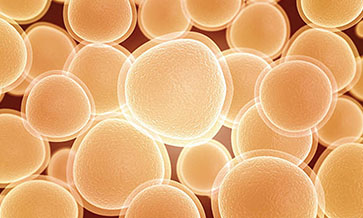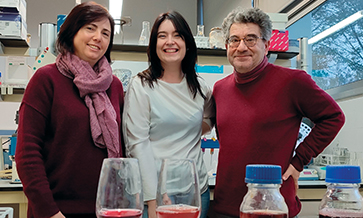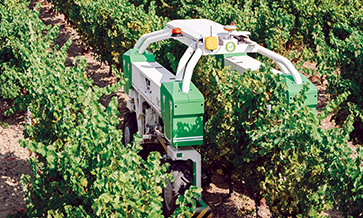Hypro Engineers also has solutions for distilleries, wineries, hops producers
Carbon dioxide (CO2) is a natural byproduct of fermentation in beers. It is also required for the carbonation of beers, which is an essential step in beer brewing as it forms the beer bubbles (aromatic foam).
To meet CO2 demands craft and micro-breweries invest in buying it from the open market. The CO2 sold by these sources may come after the recovery of CO2 from flue gas generated during the burning of oil or diesel, or it may come from a bio-gas plant, distillery, or chemical processing factory.
To use this CO2 a brewery would need a CO2 cylinder station, distribution network, and manpower to handle the gas. Moreover, to determine if the CO2 is food grade or not, complex analytics are needed.
An ideal way to achieve pure CO2 is to utilize carbon dioxide from your own source! For guaranteed quality control why not recover the CO2 from your own brewery? It is a benefit that no other source can offer.
Similarly, CO2 is generated in distilleries during fermentation of molasses or food grains. For distillery-based CO2 capture, however, special odour treatment is essential to produce food-grade CO2.
The odour treatment system is in two stages, depending on the level of impurities at the source and is equipped with an oxidation unit for nearly complete removal of sulphur compounds.
The liquefied CO2 is then either bottled in cylinders or fed to a dry ice production plant.
Natural process
In fermentation, the production of CO2 is a natural process. Historically, much of the natural CO2 by-product escaped into the air during fermentation, but there’s a better way. It is time now to harness its potential. As the demand for CO2 in various industries continues to rise it is crucial to find sustainable solutions.
Continuously changing climate conditions have a potential demand to alter traditional brewing practices that have been passed down to generations. CO2 recovery is a necessary practice that should be implemented by not only industrial breweries but also micro-breweries, to reduce carbon emissions and thereby help conserve the environment.
A lean CO2 gas recovery system is designed for 95% v/v. This means that CO2 collection for recovery starts about 24 hours after the start of the wort fermentation cycle. This results in lower CO2 collection and venting of CO2 to the atmosphere in this initial period.
The recommended CO2 pressure range is between 7 and 38 PSI (pounds per square inch) depending upon the style of the beer such as ales, lagers, pilsners and stouts. An inaccurate pressure may result in under- or over-carbonation. This may have adverse effects, such as flat or overly foamy beer.
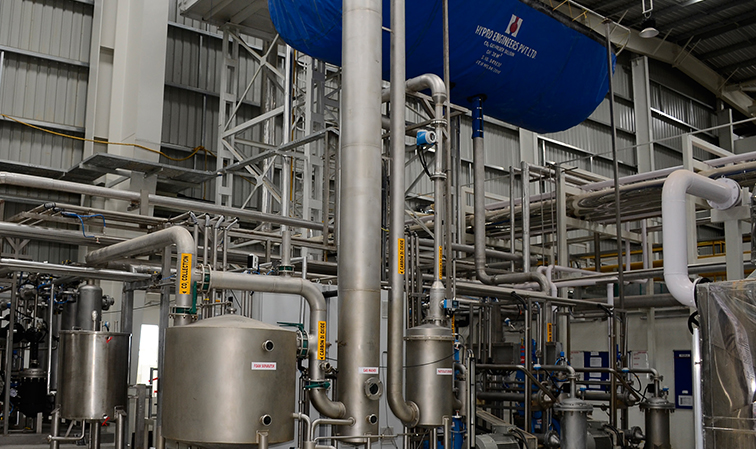
Hypro’s most energy-efficient (MEE) plant is ideal for large-scale production of beer.
HyCrCTM plant
Pune-based Hypro Engineers, which completed 25 years of Indian and overseas operations this year, has made CO2 recovery much simpler, compact and effective, ensuring that craft and industrial-scale brewers alike can get only pure and reliable CO2 supply.
Proof of the company’s credentials lies in the impressive list of industry-leading breweries and distilleries where Hypro Engineers has installed its CO2 recovery systems, in India and abroad.
Among them are AB InBev, Sab Miller, Carlsberg, Molson Coors, United Breweries, Lion Breweries, Manav Breweries, Sica Breweries, Blossom Industries, Millenium Beer Industries, Devans Breweries, Universal Breweries and Crown Beers International.
Hypro’s HyCrCTM plant simplifies brewing and distilling operations, ensuring a consistent supply of pure CO2, sourced directly from your own fermentation processes. The plant’s design prioritises minimal space utilisation, is fully automatic and can be operated remotely.
It collects CO2 in vapour form, efficiently converting it to liquid to maximise storage in a small footprint and then re-evaporate it while recovering energy. Its intuitive operation panel eliminates the need for a dedicated operator, making it user-friendly.
The main module operates to recover CO2 from the fermenter; the counter pressure module helps balancing and recovery from pressurised tank transfer to filters and filler. It delivers up to 120 kg per hour of liquid CO2 and is ideal for small-scale production.
Energy-efficient
To utilize a HyCrCTM plant effectively, you will need to connect the raw CO2 generated, electrical power, water, glycol, and compressed air to the plant’s inlet. In return, HyCrCTM delivers pure CO2 at the plant’s outlet, all at a pressure of 7 Bar in vapour form.
When a brewer recovers CO2 from his/her own fermentation processes, s/he has full confidence in the source, thus meeting CO2 at food-grade standard (99.998% v/v purity).
Hypro’s MEE (most energy-efficient) CO2 recovery system can produce up to 1,000 kg per hour of liquid CO2 and is ideal for large-scale production of beers. The company’s HyCrC CO2 recovery plant produces up to 700 kg per hour of liquid CO2. It is ideal for large-scale extraction of super-critical hops.
The challenges put forth to the recovery plant are fine particles of extracts getting entrained into the gas, especially with high-gravity brewing systems. These fine particles pose greater problems of maintenance to the CO2 compressor.
Similarly, the by-products of fermentation get carried over as impurities in the CO2 gas. These impurities necessitate various treatment methods to remove alcohols, moisture, odour compounds and non-condensable gases.
Once these impurities are removed the gas needs to be stored. To reduce the storage volume and to also get rid of non-condensable gases, CO2 is liquefied.
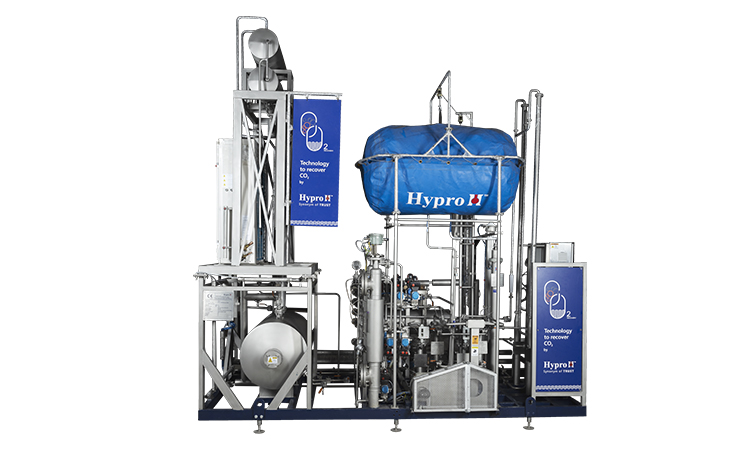
Rugged construction
All equipment is necessarily produced with stainless steel as the material of construction, the exception being liquid CO2 storage tanks which are made in low-temperature carbon steel.
The piping for CO2 is also in stainless steel, providing long life to the components and eliminating rust and impurities from corrosion. The absorbers, scrubbers, strippers and distillation columns are all provided with high efficiency structured packings as a standard.
Based on the capacity the plant is configured in such a way that expansion is possible by additional equipment. And although the layout is compact, enough space is planned for maintenance.
For bigger plants, CO2 gas compressors are configured in such a way that during lean season load is catered by completely shutting down one of the CO2 compressors, thereby providing flexibility of operation and saving energy. For more information, write to info@hypro.co.in.













